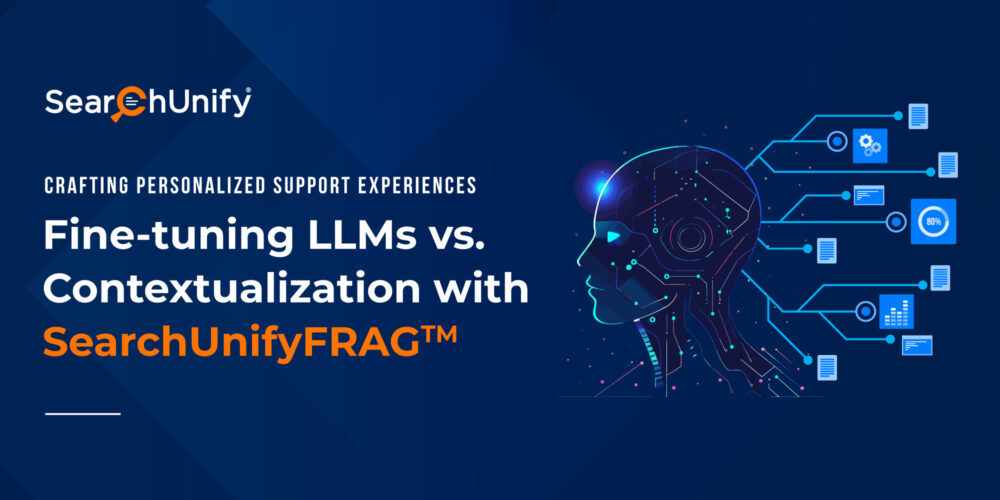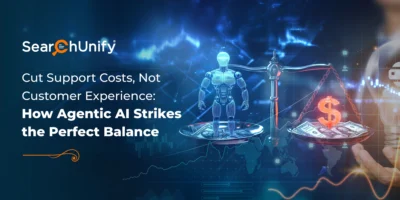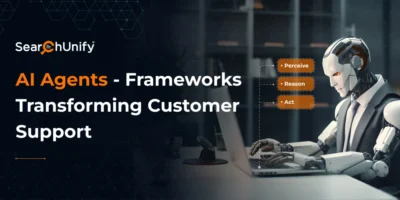
Large Language Models (LLMs) hold immense promise for revolutionizing customer support, offering the potential for 24/7 availability, instant responses, and personalized assistance. However, unleashing the true power of LLMs in support interactions requires a nuanced approach that goes beyond simply deploying a generic model. The key lies in tailoring the LLM’s knowledge and conversational abilities to align with your specific support function, customer base, and desired level of personalization.
This blog post delves into two primary methods for achieving this: fine-tuning LLMs for specialized support domains and contextualizing LLM-powered conversations using a robust platform like SearchUnifyFRAGTM.
I. Fine-tuning LLMs for Specialized Support Domains
Fine-tuning is akin to taking a general-purpose LLM and molding it into a subject matter expert for your specific support needs. It involves training the LLM on your unique data and processes to equip it with the knowledge and conversational skills necessary to excel in your support environment.

1. Data: The Foundation of Successful Fine-tuning
The success of fine-tuning hinges on the quality, relevance, and comprehensiveness of the data used for training. This data should encompass all aspects of your support function:
- Support Tickets and Transcripts: A treasure trove of insights into common customer issues, frequently asked questions, and effective resolution strategies.
- Knowledge Base Articles and FAQs: Provides the LLM with a deep understanding of your products, features, and troubleshooting procedures.
- Customer Feedback and Surveys: Helps the LLM adapt its tone and language to match customer preferences and communication styles.
- Product Documentation and Specifications: Ensures the LLM possesses accurate and up-to-date information about product functionalities, limitations, and technical details.
2. Preparing Your Data for LLM Consumption
Raw data needs refinement before it can be fed into an LLM. This involves:
- Data Cleaning: Removing irrelevant information, correcting errors, and standardizing formatting to ensure consistency.
- Text Normalization: Converting text to lowercase, handling special characters, and potentially applying techniques like stemming or lemmatization to reduce word variations.
- Tokenization: Breaking down text into individual words or sub-word units that the LLM can process.
- Data Splitting: Dividing the data into training, validation, and test sets to facilitate effective model training and evaluation.
3. Fine-tuning Techniques: Shaping the LLM’s Expertise
Several techniques can be employed to fine-tune LLMs for customer support:
- Supervised Fine-tuning: Providing the LLM with labeled examples of customer queries and corresponding helpful responses, training it to map similar inputs to appropriate outputs.
- Reinforcement Learning from Human Feedback (RLHF): Utilizing human feedback to guide the LLM’s learning process, rewarding desirable outputs and penalizing undesirable ones.
- Prompt Engineering: Carefully crafting prompts or instructions that elicit specific types of responses from the LLM, guiding it towards generating accurate and helpful information.
4. Evaluating Fine-tuning Success: Measuring What Matters
Evaluating the effectiveness of your fine-tuned LLM is crucial to ensure it meets your support objectives. Key metrics include:
- Accuracy: How frequently does the LLM provide correct and relevant information in response to customer queries?
- Fluency and Coherence: Are the LLM’s responses grammatically sound, natural-sounding, and easy for customers to understand?
- Helpfulness and Resolution Rate: Does the LLM effectively address customer concerns and provide solutions that lead to successful issue resolution?
- Customer Satisfaction: Are customers satisfied with the LLM’s responsiveness, helpfulness, and overall interaction experience?
Fine-tuning, while powerful, is a resource-intensive process, demanding significant time, computational resources, and expertise.
II. Contextualizing LLM-Powered Conversations with SearchUnifyFRAGTM
An alternative to full-fledged fine-tuning is contextualization, a more agile and efficient approach that leverages existing LLM capabilities while enriching conversations with relevant context from various sources. SearchUnifyFRAGTM excels in this domain, empowering businesses to deliver highly personalized support experiences without the complexities of extensive fine-tuning.

1. Tapping into Customer Data and History
SearchUnifyFRAGTM integrates with your CRM, support systems, and other relevant data sources to provide the LLM with a comprehensive view of each customer:
- Account Information: Understanding the customer’s plan type, purchase history, and past interactions enables tailored responses.
- Interaction History: Accessing previous support requests, resolutions, and feedback prevents repetitive questions and enables more personalized solutions.
- Behavioral Data: Analyzing website browsing patterns, product usage data, or support content consumption offers insights into current needs and challenges.
2. Maintaining Conversation History for Seamless Interactions
Tracking the conversation flow and previous interactions is essential for delivering coherent and contextually relevant responses.
- Short-Term Memory: SearchUnifyFRAGTM overcomes the limited memory of LLMs by storing and accessing recent conversation history, ensuring the LLM can refer back to previous turns and maintain context.
- Long-Term Memory: For recurring customers, SearchUnifyFRAGTM accesses historical data from past interactions across various channels, providing valuable context and further personalizing the current conversation.
3. Dynamically Adapting Responses Based on Context
Contextual information should dynamically influence the LLM’s response generation. SearchUnifyFRAGTM enables:
- Personalized Greetings and Language: Addressing customers by name and adapting the language style to their preferences enhances the personal touch.
- Context-Aware Information Retrieval: Instead of offering generic answers, the LLM retrieves information relevant to the customer’s specific situation and query, ensuring accuracy and relevance.
- Proactive Recommendations and Solutions: Based on the customer’s history and current context, the LLM proactively offers solutions, troubleshooting steps, or helpful resources, exceeding customer expectations.
4. Ensuring Seamless Human Handoff When Needed
Despite advancements, LLMs may not always possess the answer. SearchUnifyFRAGTM ensures a seamless transition to human agents when necessary:
- Detecting Complex or Sensitive Issues: The system is trained to recognize situations requiring human intervention, such as complex technical problems, emotional distress, or sensitive account information.
- Providing Context to Human Agents: When transferring to a human agent, SearchUnifyFRAGTM provides a concise summary of the conversation history and relevant customer data, ensuring a smooth transition and faster resolution.
Conclusion:
While fine-tuning LLMs holds potential for creating highly specialized support agents, contextualization with a platform like SearchUnifyFRAGTM offers a more pragmatic and efficient path to personalized customer experiences. By seamlessly integrating customer data, maintaining conversation history, and dynamically adapting responses, SearchUnifyFRAGTM unlocks the true power of LLMs in customer support, delivering personalized, efficient, and satisfying interactions that drive customer loyalty and business growth.
Ready to experience the power of personalized LLM-driven support without the complexities of fine-tuning? Schedule a demo with SearchUnify today and discover how our platform can transform your customer interactions!











